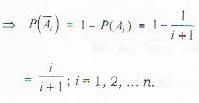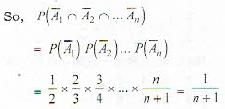Mathematics Exam > Mathematics Questions > For n independent events A1, A2, ...., An, le...
Start Learning for Free
For n independent events A1, A2, ...., An, let P(Ai) = 1/(i+1), i = 1, 2 ..., n. Then, the probability that none of the events will occur is
- a)n/(n+1)
- b)n-1/(n+1)
- c)1/(n+1)
- d)1/n
Correct answer is option 'C'. Can you explain this answer?
| FREE This question is part of | Download PDF Attempt this Test |
Verified Answer
For n independent events A1, A2, ...., An, let P(Ai) = 1/(i+1), i = 1,...



Most Upvoted Answer
For n independent events A1, A2, ...., An, let P(Ai) = 1/(i+1), i = 1,...
Probability that none of the events will occur:
To find the probability that none of the events will occur, we need to find the probability of the complement of the union of all the events.
Complement of the union of events:
The complement of the union of events is the event that none of the events occur. Let's denote this event as A'.
Using the complement rule:
According to the complement rule of probability, the probability of an event A' is equal to 1 minus the probability of the event A.
Probability of the union of events:
To find the probability of the union of all the events, we can use the principle of inclusion-exclusion.
Inclusion-Exclusion Principle:
The principle of inclusion-exclusion states that the probability of the union of two events A and B is given by:
P(A U B) = P(A) + P(B) - P(A ∩ B)
Applying the inclusion-exclusion principle:
Using the inclusion-exclusion principle, we can find the probability of the union of n events A1, A2, ..., An as follows:
P(A1 U A2 U ... U An) = P(A1) + P(A2) + ... + P(An) - P(A1 ∩ A2) - P(A1 ∩ A3) - ... - P(An-1 ∩ An) + P(A1 ∩ A2 ∩ A3) + ... + (-1)^(n-1) * P(A1 ∩ A2 ∩ ... ∩ An)
Probability of each individual event:
Given that P(Ai) = 1/(i+1), we can substitute these probabilities into the formula for the probability of the union of events.
Calculating the probability:
P(A1 U A2 U ... U An) = 1/2 + 1/3 + ... + 1/(n+1) - 1/2∩3 - 1/2∩4 - ... - 1/(n-1)∩n + 1/2∩3∩4 + ... + (-1)^(n-1) * 1/2∩3∩...∩(n+1)
Simplifying the expression:
After simplifying the expression, we can observe that all the terms in the sum will cancel out, leaving us with only 1/(n+1).
Probability that none of the events will occur:
Finally, we can use the complement rule to find the probability of the event A', which is the event that none of the events A1, A2, ..., An occur.
P(A') = 1 - P(A1 U A2 U ... U An)
P(A') = 1 - 1/(n+1)
P(A') = n/(n+1)
Therefore, the probability that none of the events will occur is n/(n+1), which can be simplified to 1/(n+1). Hence, the correct answer is option 'C'.
To find the probability that none of the events will occur, we need to find the probability of the complement of the union of all the events.
Complement of the union of events:
The complement of the union of events is the event that none of the events occur. Let's denote this event as A'.
Using the complement rule:
According to the complement rule of probability, the probability of an event A' is equal to 1 minus the probability of the event A.
Probability of the union of events:
To find the probability of the union of all the events, we can use the principle of inclusion-exclusion.
Inclusion-Exclusion Principle:
The principle of inclusion-exclusion states that the probability of the union of two events A and B is given by:
P(A U B) = P(A) + P(B) - P(A ∩ B)
Applying the inclusion-exclusion principle:
Using the inclusion-exclusion principle, we can find the probability of the union of n events A1, A2, ..., An as follows:
P(A1 U A2 U ... U An) = P(A1) + P(A2) + ... + P(An) - P(A1 ∩ A2) - P(A1 ∩ A3) - ... - P(An-1 ∩ An) + P(A1 ∩ A2 ∩ A3) + ... + (-1)^(n-1) * P(A1 ∩ A2 ∩ ... ∩ An)
Probability of each individual event:
Given that P(Ai) = 1/(i+1), we can substitute these probabilities into the formula for the probability of the union of events.
Calculating the probability:
P(A1 U A2 U ... U An) = 1/2 + 1/3 + ... + 1/(n+1) - 1/2∩3 - 1/2∩4 - ... - 1/(n-1)∩n + 1/2∩3∩4 + ... + (-1)^(n-1) * 1/2∩3∩...∩(n+1)
Simplifying the expression:
After simplifying the expression, we can observe that all the terms in the sum will cancel out, leaving us with only 1/(n+1).
Probability that none of the events will occur:
Finally, we can use the complement rule to find the probability of the event A', which is the event that none of the events A1, A2, ..., An occur.
P(A') = 1 - P(A1 U A2 U ... U An)
P(A') = 1 - 1/(n+1)
P(A') = n/(n+1)
Therefore, the probability that none of the events will occur is n/(n+1), which can be simplified to 1/(n+1). Hence, the correct answer is option 'C'.

|
Explore Courses for Mathematics exam
|

|
Similar Mathematics Doubts
For n independent events A1, A2, ...., An, let P(Ai) = 1/(i+1), i = 1, 2 ..., n. Then, the probability that none of the events will occur isa)n/(n+1)b)n-1/(n+1)c)1/(n+1)d)1/nCorrect answer is option 'C'. Can you explain this answer?
Question Description
For n independent events A1, A2, ...., An, let P(Ai) = 1/(i+1), i = 1, 2 ..., n. Then, the probability that none of the events will occur isa)n/(n+1)b)n-1/(n+1)c)1/(n+1)d)1/nCorrect answer is option 'C'. Can you explain this answer? for Mathematics 2024 is part of Mathematics preparation. The Question and answers have been prepared according to the Mathematics exam syllabus. Information about For n independent events A1, A2, ...., An, let P(Ai) = 1/(i+1), i = 1, 2 ..., n. Then, the probability that none of the events will occur isa)n/(n+1)b)n-1/(n+1)c)1/(n+1)d)1/nCorrect answer is option 'C'. Can you explain this answer? covers all topics & solutions for Mathematics 2024 Exam. Find important definitions, questions, meanings, examples, exercises and tests below for For n independent events A1, A2, ...., An, let P(Ai) = 1/(i+1), i = 1, 2 ..., n. Then, the probability that none of the events will occur isa)n/(n+1)b)n-1/(n+1)c)1/(n+1)d)1/nCorrect answer is option 'C'. Can you explain this answer?.
For n independent events A1, A2, ...., An, let P(Ai) = 1/(i+1), i = 1, 2 ..., n. Then, the probability that none of the events will occur isa)n/(n+1)b)n-1/(n+1)c)1/(n+1)d)1/nCorrect answer is option 'C'. Can you explain this answer? for Mathematics 2024 is part of Mathematics preparation. The Question and answers have been prepared according to the Mathematics exam syllabus. Information about For n independent events A1, A2, ...., An, let P(Ai) = 1/(i+1), i = 1, 2 ..., n. Then, the probability that none of the events will occur isa)n/(n+1)b)n-1/(n+1)c)1/(n+1)d)1/nCorrect answer is option 'C'. Can you explain this answer? covers all topics & solutions for Mathematics 2024 Exam. Find important definitions, questions, meanings, examples, exercises and tests below for For n independent events A1, A2, ...., An, let P(Ai) = 1/(i+1), i = 1, 2 ..., n. Then, the probability that none of the events will occur isa)n/(n+1)b)n-1/(n+1)c)1/(n+1)d)1/nCorrect answer is option 'C'. Can you explain this answer?.
Solutions for For n independent events A1, A2, ...., An, let P(Ai) = 1/(i+1), i = 1, 2 ..., n. Then, the probability that none of the events will occur isa)n/(n+1)b)n-1/(n+1)c)1/(n+1)d)1/nCorrect answer is option 'C'. Can you explain this answer? in English & in Hindi are available as part of our courses for Mathematics.
Download more important topics, notes, lectures and mock test series for Mathematics Exam by signing up for free.
Here you can find the meaning of For n independent events A1, A2, ...., An, let P(Ai) = 1/(i+1), i = 1, 2 ..., n. Then, the probability that none of the events will occur isa)n/(n+1)b)n-1/(n+1)c)1/(n+1)d)1/nCorrect answer is option 'C'. Can you explain this answer? defined & explained in the simplest way possible. Besides giving the explanation of
For n independent events A1, A2, ...., An, let P(Ai) = 1/(i+1), i = 1, 2 ..., n. Then, the probability that none of the events will occur isa)n/(n+1)b)n-1/(n+1)c)1/(n+1)d)1/nCorrect answer is option 'C'. Can you explain this answer?, a detailed solution for For n independent events A1, A2, ...., An, let P(Ai) = 1/(i+1), i = 1, 2 ..., n. Then, the probability that none of the events will occur isa)n/(n+1)b)n-1/(n+1)c)1/(n+1)d)1/nCorrect answer is option 'C'. Can you explain this answer? has been provided alongside types of For n independent events A1, A2, ...., An, let P(Ai) = 1/(i+1), i = 1, 2 ..., n. Then, the probability that none of the events will occur isa)n/(n+1)b)n-1/(n+1)c)1/(n+1)d)1/nCorrect answer is option 'C'. Can you explain this answer? theory, EduRev gives you an
ample number of questions to practice For n independent events A1, A2, ...., An, let P(Ai) = 1/(i+1), i = 1, 2 ..., n. Then, the probability that none of the events will occur isa)n/(n+1)b)n-1/(n+1)c)1/(n+1)d)1/nCorrect answer is option 'C'. Can you explain this answer? tests, examples and also practice Mathematics tests.

|
Explore Courses for Mathematics exam
|

|
Suggested Free Tests
Signup for Free!
Signup to see your scores go up within 7 days! Learn & Practice with 1000+ FREE Notes, Videos & Tests.


















